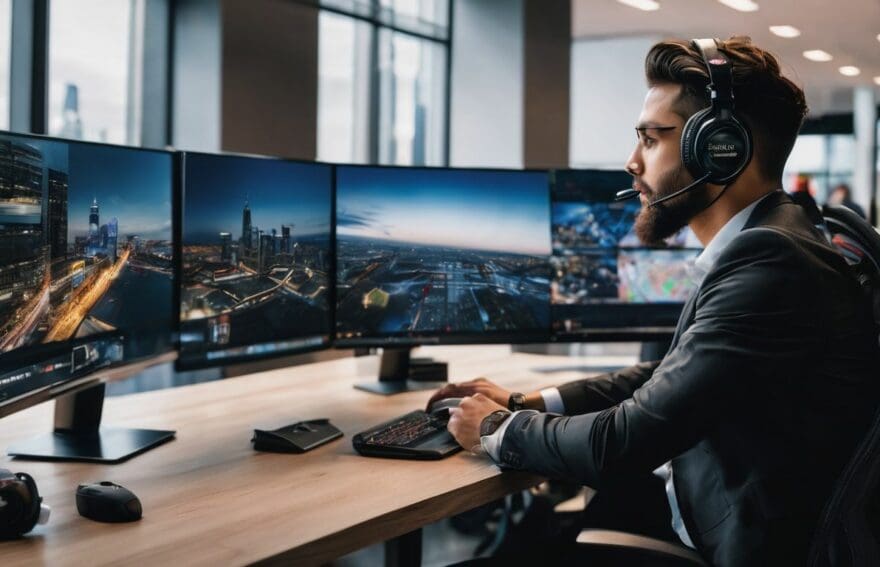The Role of Agents and Managers in Professional Esports

Updated On: October 24, 2025 by James Connolly
In the ever-evolving realm of professional esports, the intricacies extend far beyond what meets the eye. We all know how complex it can be, navigating the off-screen challenges that players face daily.
That’s why we’ve dedicated ourselves to uncovering the pivotal roles of agents and managers; those behind-the-scenes champions who deftly negotiate contracts, secure sponsorships, and ensure our gaming heroes are primed for success.
Join us as we delve into this lesser-seen facet of esports and celebrate the dedication of these unsung heroes who keep the industry thriving.
Understanding the Role of Agents and Managers in Professional Esports
Agents and managers in professional esports play a crucial role in representing players, negotiating contracts, managing finances, and handling media relations. Their expertise is essential for the success and growth of professional gamers in the industry.
Who are agents and managers in esports
In the exciting world of professional esports, agents are the power players working behind the scenes. They represent esports athletes with as much dedication as sports agents do for traditional athletes.
Their main tasks involve negotiating contracts and securing lucrative sponsorship deals that benefit their clients’ careers in competitive gaming.
Managers in esports handle a team’s day-to-day needs, focusing on everything from organising practice schedules to managing travel plans for tournaments. They also play an essential role in supporting players emotionally, keeping spirits high and motivation strong during intense training regimes and competitions.
With their guidance, teams strive to achieve peak performance and maintain a professional standard within the ever-growing esports industry.
Their responsibilities and duties
Agents and managers in professional esports have crucial responsibilities and duties that contribute to the success of players and teams. Here’s a detailed look at what they do:
- Negotiating player contracts with teams and sponsors to secure favourable terms for players.
- Facilitating sponsorship deals, managing finances, and strategising for long-term career growth.
- Handling media and public relations to maintain a positive image for players and teams.
- Organising team logistics, ensuring preparedness for competitions, and managing player well-being.
- Providing professional gamer representation, marketing, sales, event management, and corporate consulting services.
- Motivating players, maintaining practice regimens, and boosting confidence during low moments.
Importance of their role in the industry
Their responsibilities and duties are pivotal to the industry’s growth, as esports agents and managers play a crucial role in shaping the careers of professional players. They ensure that players are adequately represented, negotiate contracts, and secure sponsorship deals, contributing significantly to the financial stability of individual gamers and entire teams.
Beyond financial aspects, they also focus on player motivation and confidence-building exercises. This level of support helps sustain a healthy ecosystem within professional esports by enabling players to focus on their performance while ensuring their overall well-being is taken care of – an essential element often overlooked but essential for success in the competitive gaming scene.
Benefits of Having an Agent or Manager in Esports
Having an agent or manager in esports can provide players with valuable support in negotiating contracts and securing sponsorship deals. They also play a crucial role in managing finances, career growth, and handling media and public relations for players.
Negotiating contracts and sponsorship deals
Agents and managers play a vital role in negotiating contracts and securing sponsorship deals for esports athletes. They leverage their expertise to ensure that players receive fair compensation and favourable terms in their contractual agreements with teams, organisations, and sponsors.
This involves skillfully navigating the intricacies of esports industry standards, player rights, and market trends to secure the best possible deals for their clients. By leveraging their negotiation skills and industry knowledge, agents can help players access lucrative opportunities, enabling them to focus on their gameplay without the added stress of contract negotiations.
Additionally, agents are instrumental in identifying potential sponsorship opportunities that align with a player’s brand and values. They work diligently to secure partnerships that offer substantial financial support while bolstering a player’s visibility within the industry.
This strategic approach is designed to cultivate long-term relationships between players and sponsors, paving the way for sustained career growth within professional esports.
Managing finances and career growth
As esports agents secure lucrative contracts and sponsorship deals, they also play a pivotal role in managing the financial aspects of their clients’ careers. They oversee budgeting, ensuring that players receive fair compensation and that their earnings are well-managed for long-term career growth.
This involvement in finance allows players to focus on honing their skills while feeling confident about the security and trajectory of their professional gaming careers. Moreover, managers provide guidance on career development, offering support and resources to help gamers navigate the competitive industry landscape successfully.
Dealing with media and public relations
Once professional players have secured their contracts and managed their finances, they must navigate the world of media and public relations. This involves everything from conducting interviews to attending press conferences and managing social media presence.
Agents and managers often play a vital role in coaching players on how to present themselves positively in the public eye. They may arrange media appearances or handle requests for interviews, ensuring that the player’s image is maintained professionally.
Understanding the importance of positive representation can be crucial, as it enhances player branding opportunities and fosters goodwill among fans and sponsors alike. Implementing effective PR strategies can greatly contribute to a player’s success both on and off the screen, elevating their career prospects within the esports industry.
How to Become an Esports Agent or Manager
To become an esports agent or manager, one must pursue education and training in the industry, gain relevant experience, and actively network and build relationships within the esports community.
For more insights on how to kickstart a career in esports management, continue reading!
Education and training
Agents and managers in professional esports typically require a combination of formal education and practical experience to excel in their roles. Pursuing a degree or certification in sports management, business administration, or marketing can provide valuable knowledge about the industry and its unique dynamics.
Additionally, gaining hands-on experience through internships or entry-level positions within esports organisations is crucial for understanding the day-to-day operations, player management, contract negotiations, and event coordination that are integral to this field.
Building a strong network within the esports community also plays a pivotal role in advancing one’s career as an agent or manager.
Training programmes specifically tailored to the nuances of esports management can offer comprehensive insights into player representation, team dynamics, industry trends, and legal considerations.
Gaining experience in the industry
Gaining experience in the industry of esports management or agency work is crucial for those looking to break into this field. Education and training are essential, but hands-on experience is equally valuable.
By volunteering at local gaming events, interning with established agencies, or participating in amateur esports tournaments, individuals can gain practical insights into the industry’s workings and build a network of contacts.
Moreover, actively engaging with online communities dedicated to professional gaming can provide invaluable exposure to industry trends and opportunities.
Networking and building relationships
After gaining experience in the industry, networking and building relationships become essential for aspiring esports agents and managers. Connecting with players, teams, industry professionals, and potential clients can open doors to new opportunities.
Attending gaming events, joining online communities and forums dedicated to esports, and actively engaging with others on social media platforms can help build a strong network within the industry.
Building genuine relationships based on trust and mutual respect is vital for establishing oneself as a reputable agent or manager in professional esports.
Developing meaningful connections provides access to valuable insights into the industry’s trends, challenges, and developments. Collaborating with other professionals allows for knowledge sharing and support that can contribute to career growth.
The Changing Landscape of Agents and Managers in Esports
As the esports industry continues to grow, the need for specialised representation for players and teams has become more crucial. This has led to the rise of in-house agents and managers within organisations, creating a shift in how professionals in esports are managed and represented.
The growth of the esports industry
The esports industry has experienced rapid and exponential growth in recent years, becoming a prominent force within the global entertainment landscape. With an increasing number of players, spectators, and investment opportunities, the industry continues to evolve at an unprecedented rate.
This growth has led to a surge in demand for professional agents and managers who play pivotal roles in representing esports athletes, negotiating contracts, managing teams, and ensuring overall career development.
As the industry expands further into mainstream recognition and acceptance, the need for specialised representation becomes even more crucial.
Esports management agencies are also adapting to this growth by offering a wider range of services such as professional gamer representation, marketing strategies tailored to the industry’s unique needs, event management support, and corporate consulting.
The need for specialised representation
With the growth of the esports industry, there is a pressing need for specialised representation to cater to the unique requirements of professional gamers. Esports athletes and teams require agents and managers who have a deep understanding of the industry, including its contracts, sponsorship deals, and specific career paths.
This specialised representation ensures that players have advocates who can negotiate on their behalf and manage their careers effectively, ultimately contributing to the overall success and sustainability of professional esports.
Esports management agencies like eSports Management Group offer tailored services that meet the distinct needs of gamers and organisations in this evolving industry. These agencies provide not only professional gamer representation but also marketing expertise, event management support, sales guidance, as well as corporate consulting – all essential components for navigating the complexities within professional esports.
The rise of in-house agents and managers
Esports organisations are increasingly opting to bring agent and management roles in-house. This trend reflects the industry’s maturation, as it allows teams to provide specialised representation directly.
By having in-house agents and managers, esports organisations can better focus on the unique needs of their players and take a more hands-on approach to navigating player contracts, sponsorship deals, and career growth opportunities.
In-house agents and managers offer tailored support that aligns with the team’s goals while also ensuring closer relationships between players and their representatives. With this shift, esports professionals benefit from more personalised attention aimed at maximising their potential within the industry.
The Role of Agents and Managers in Shaping the Future of Esports
Agents and managers play a critical role in shaping the future of esports by impacting player contracts, professionalising the industry, and navigating legal and ethical issues. Their expertise will be vital as the industry continues to grow and develop.
Impact on player and team contracts
Esports agents play a pivotal role in negotiating player contracts and securing lucrative sponsorship deals. Their expertise ensures that players receive fair compensation for their skills and contributions to the team’s success.
This not only helps players build more stable careers but also elevates the overall standard of contracts within the industry, creating a more professional environment for all involved.
Team managers work closely with agents to secure favorable terms for their teams, often focusing on ensuring fair treatment and suitable conditions for their players. By navigating the complexities of contract negotiations, they contribute to building stronger teams that are well-equipped to achieve success in competitive esports leagues.
Creating a more professional and sustainable industry
To create a more professional and sustainable industry, agents and managers in esports are working to establish ethical standards and best practices for player representation. They play a crucial role in ensuring fair contracts, protecting players’ rights, and fostering a healthy competitive environment.
By advocating for the well-being of players and promoting transparency in business dealings, agents and managers contribute to the long-term growth and credibility of the esports industry.
Their efforts not only benefit individual players but also have a broader impact on shaping the overall landscape of professional gaming. Through their guidance, mentorship, and advocacy for industry improvements, they help lay the groundwork for an increasingly reputable esports sector that provides opportunities for sustainable careers in gaming.
Navigating legal and ethical issues
Esports agents and managers must be well-versed in legal and ethical matters to safeguard the interests of their players or teams. They navigate player contracts, ensuring fair terms and protecting intellectual property rights.
Additionally, they oversee compliance with gaming regulations to uphold ethical standards within the industry.
To create a professional and sustainable esports landscape, these professionals stay informed about evolving legal frameworks while upholding high ethical standards. This ensures that players are fairly represented and protected from exploitation, ultimately contributing to the credibility and longevity of the industry.
Conclusion
In conclusion, agents and managers play a pivotal role in shaping the professional esports landscape. They are essential for negotiating contracts, managing finances, and ensuring career growth for players.
Their influence goes beyond just player representation; they actively contribute to creating a more professional and sustainable industry while navigating legal and ethical issues.
As the industry continues to grow, their presence will be crucial in elevating the standards of professionalism within esports.
FAQs
1. What do esports agents do for gamers?
Esports agents help gamers build their careers, negotiate contracts, and manage bookings to ensure they can focus on improving their game with confidence.
2. How important are team managers in professional esports?
In professional esports, team managers play a crucial role by organising schedules, handling team dynamics and ensuring the players remain focused on their performance.
3. Can an esports management agency benefit my gaming career?
Absolutely! Joining an esports management agency can provide vital support such as marketing your skills, finding sponsorships and helping you make strategic decisions that advance your career.
4. Do professional esports players really need managers or agents?
Yes, having a manager or agent is essential for professional esports players because it allows them to concentrate on training while the professionals handle the business side of their careers.



